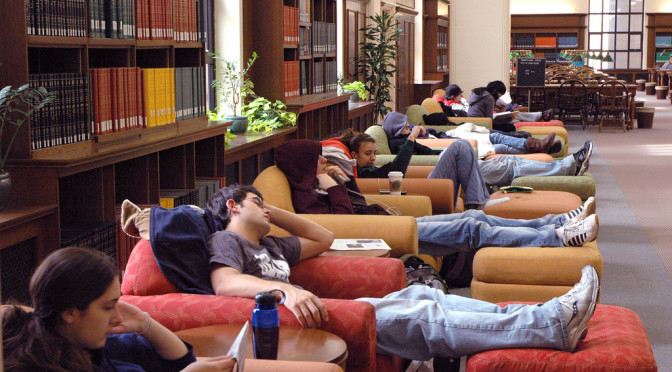Within the past few years, author and media mogul Arianna Huffington has made sleep health her pet project. In her 2010 TED talk, Huffington encouraged her audience to make sleep a priority: “The way to a more productive, more inspired, more joyful life is to get enough sleep,” she said. “We are going to sleep our way to the top — literally!”
Earlier this month, she published her latest book, The Sleep Revolution: Transforming Your Life, One Night at a Time. To promote the book, and raise awareness about healthy sleep, Huffington has started the Sleep Revolution College Tour. Recently, Schreyer Honors scholar Alayna Kennedy worked with the Schreyer Honors College and alum Lou D’Ambrosio to bring the tour to Penn State, where students learned about healthy sleep habits and received sleep kits.
I touched base with Orfeu Buxton, a Penn State associate professor of biobehavioral health and a sleep health expert who specializes in sleep, health, and society, and asked him a few questions about the particular issue of sleep and college students.
Why is it important for college students in particular to get enough sleep?
College is a unique period in the life course, where educational, social, and other experiences can have a dramatic impact on one’s life and world view. Being sleepy and grumpy, and perhaps not the best communicator or learner, can degrade your level of engagement. Getting enough sleep and exercise can be a great way to get the most out of college.
What can happen to a person who doesn’t get enough sleep in the short-term? And in the long-term?
In the short-term, sleepiness can degrade mood, attention, motivation, learning, and generally reduce energy levels, while also creating a preference for an unhealthy lifestyle, including eating less healthy foods and having less motivation for exercise. It can also make one more prone to risk-taking, like substance use.
Long-term, epidemiological evidence suggests a greater burden of chronic conditions like obesity, diabetes, cardiovascular disease, and other maladies. Laboratory studies are working out the complex mechanisms for these physical and psychological changes with chronic sleep loss.
Why do you think students brag about all-nighters? Why is it a point of pride to not sleep?
College involves substantial work, and sleepy work is less productive.
Current thinking in the business world refers to a culture of sleep loss, as if an all-nighter is worth bragging about as a sign of greater motivation. “Sleep when you’re dead” is a [common expression]. A culture that values health would see bragging about an all-nighter as someone actually bragging about poor planning, or poor time management — or like someone bragging that they got another cold. Not cool?
The Sleep Revolution flyer says: “‘Social life, good grades, and sleep. Pick two.’ The #SleepRevolution is coming to Penn State to prove that you don’t have to pick two.”
What recommendations and/or tips do you have for college students on getting enough sleep while still maintaining a schoolwork/life balance?
There’s always more you can do, but be careful of over-commitment. If you do something poorly because you are sleepy, do you want others to remember you for that? (Or your transcript to reflect that?) Many students are amazed when they “hit the wall,” have some failures, and then make some changes — usually involving dropping lower priority obligations that have grown to fill every available moment of a hectic life. When they prioritize sleep and exercise as a lifestyle, they are more productive, healthy, positive, and see their path forward more clearly.
Members of the news media interested in talking to Buxton should contact Tori Indivero at 814-865-6071 or vmi1@psu.edu.

